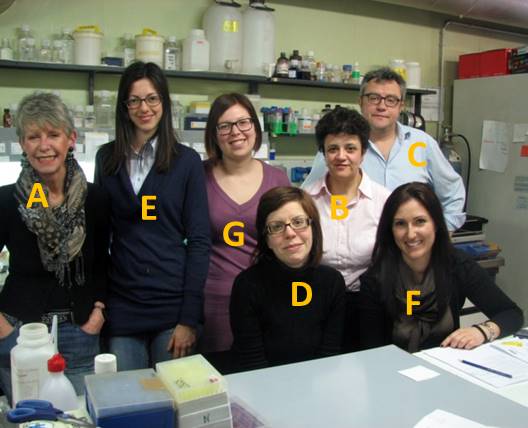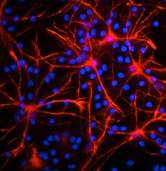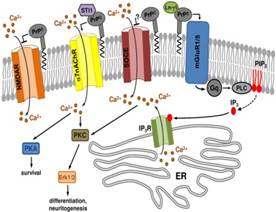Lab prion protein and neurodegeneration
Group Prof. M. Catia Sorgato
Prion Protein and Neurodegeneration
CNR Institute of Neuroscience
c/o Dept of Biomedical Sciences
University of Padova
Viale G. Colombo 3, 35121 Padova
tel.: +39 049 8276136/50/41
fax: +39 049 8073310
Lab team
 (A)M. Catia Sorgato - Professor in Biochemistry
(A)M. Catia Sorgato - Professor in Biochemistry
(B)Maria Lina Massimino - CNR Researcher
(C)Alessandro Bertoli - Assistant Professor in Biochemistry
(D)Caterina Peggion – Post-doc
(E)Agnese De Mario and Rosa Pia Norante – PhDstudents
(F)MigenaBishyti -undergraduate student
(G)Francesca Viviani -undergraduate student
Research summary
The main goal of the group is to understand the physiology of the prion protein (PrP), whose aberrant conformers act as etiological agents of fatal prion diseases  affecting animals and man, by focusing on the possible implication of the protein in the regulation of neuronal Ca2+homeostasis
affecting animals and man, by focusing on the possible implication of the protein in the regulation of neuronal Ca2+homeostasis
Concurrently, we have expanded our interest in Alzheimer’s disease and amyotrophic lateral sclerosis (ALS), by investigating on whether PrP serves as receptor for Aβ oligomers, and if Ca2+ homeostasis in the endoplasmic  reticulum and mitochondria of ALS motor neurons and astrocytes is altered, respectively. Altogether, our research relies on combining different biochemical and molecular biology techniques, using primary cell cultures and in vivo behavioral approaches based on genetically modified animal models.
reticulum and mitochondria of ALS motor neurons and astrocytes is altered, respectively. Altogether, our research relies on combining different biochemical and molecular biology techniques, using primary cell cultures and in vivo behavioral approaches based on genetically modified animal models.
Group Fundings
PRAT 2012 50000 € – Prion-based approaches to aberrant signaling in Alzheimer’s disease
AriSLA 2013 60000 € – Local perturbations of Ca2+ homeostasis as possible early mechanisms of fALS pathogenesis
Representative publications
Massimino ML, Peggion C, Loro F, Stella R, Megighian A, Scorzeto M, Blaauw B, Toniolo L, Sorgato MC, Reggiani C, Bertoli A. Age-dependent neuromuscular impairment in prion protein knock-out mice. Muscle Nerve. 53, 269-79, 2016.
De Mario A, Castellani A, Peggion C, Massimino ML, Lim D, Hill AF, Sorgato MC, Bertoli A.
The prion protein constitutively controls neuronal store-operated Ca(2+) entry through Fyn kinase.
Front Cell Neurosci. 2015 Oct 28;9:416. doi: 10.3389/fncel.2015.00416. eCollection 2015.
Zanetti F, Carpi A, Menabò R, Giorgio M, Schulz R, Valen G, Baysa A, Massimino ML, Sorgato MC, Bertoli A, Di Lisa F. The cellular prion protein counteracts cardiac oxidative stress.Cardiovasc Res. 104, 93-102, 2014.
Massimino, M.L., Redaelli, M., Bertoli, A., Sorgato, M.C., and Mucignat-Caretta, C.
Altered behavioral aspects of aged mice lacking the cellular prion protein. Physiology & Behavior 119: 86–91 (2013)
Stella, R., Cifani, P., Peggion, C., Hansson, K., Lazzari, C., Bendz, M., Levander, F., Sorgato, M. C., Bertoli, A., and James, P.
Relative Quantification of Membrane Proteins in Wild-type and PrP-knockout Cerebellar Granule Neurons. J. Proteome Res. 11:523-36 (2012).
Lazzari, C., Peggion, C., Stella, R., Massimino, M.L., Bertoli, A., and Sorgato, M.C.
Cellular prion protein is implicated in the regulation of local Ca2+ movements in cerebellar granule neurons. J. Neurochem. 116, 881–890 (2011)
Stella, R., Massimino, M.L., Sandri, S., Sorgato, M.C., and Bertoli, A.
Cellular prion protein promotes regeneration of adult muscle tissue. Mol. Cell. Biol. 30, 4864-4876 (2010).
Caputo, A., Sarnataro, D., Campana, V., Costanzo, M., Negro, A., Sorgato, M.C., and Zurzolo, C.
Doppel and PrPC co-immunoprecipitate in detergent-resistant membrane domains of epithelial FRT cells. Biochem.J. 425:341-51 (2009).
Sorgato, M.C., and Bertoli, A.
From cell protection to death: may Ca2+ signals explain the chameleonic attributes of the mammalian prion protein?. Biochem Biophys. Res. Comm. 379, 171-179 (2009).
Genovesi, S., Leita, L., Sequi, P., Andrighetto, I., Sorgato, M.C., and Bertoli, A.
Direct Detection of Soil-Bound Prions. PloS ONE 2, e1069 (2007).











